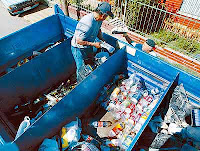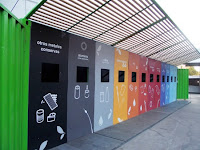domingo, 17 de junio de 2012
What is plastic?
Plastics are characterized by high density ratio resistance, excellent properties for thermal and electrical insulation and good resistance to acids, alkalis and solvents. The massive molecules that are composed may be linear, branched or crosslinked, depending on the type of plastic. Linear and branched molecules are thermoplastic (soften with heat), while intersecting are thermostable (not soften with heat).
TO SERVE THE PLASTIC?

The plastic is to become the leading industrial material because of its impermeability, good electrical insulation, easy moldability and low price.
This material is very versatile. The plastic may be soft or hard, flexible or rigid, opaque or transparent, as a function of the chemicals with which it is made. Plastic items are everywhere, from inside a car or a refrigerator to clothing, toys, DVD, phone, tools, kitchen items and anything we can imagine.
One of the main applications of plastic is the packaging. Sold a good amount of low density polyethylene in the form of rolls of clear plastic wrapper. High density polyethylene is used for thicker plastic films, such as that used in the garbage bags.
They are also used in packaging: polypropylene, polystyrene, polyvinyl chloride (PVC) and polyvinylidene chloride. The latter is used in applications requiring sealing, as it does not allow passage of gases (eg oxygen) into or out of the package. Similarly, polypropylene is a good barrier against water vapor has domestic applications and is used as fibers for manufacturing carpets and ropes.
HOW TO RECYCLE PLASTIC?
Plastic recycling is the reprocessing of waste plastic and waste plastic material again. Recycled plastic products using a 20% to 40% less energy than the production of new plastic.
Plastic is created by combining an oil or natural gas with oxygen or chlorine. This process requires the burning of large quantities of oil. If we recycle all our plastics could reduce our oil consumption and save 25% of our landfill space. Recycling of plastic consists of three stages:
 -Collection: separation of waste into two basic groups: organic waste and inorganic waste. Two bags, each with one type of waste will be placed in the street and will be collected ENFORMA differentiated, allowing you to treat specifically.
-Collection: separation of waste into two basic groups: organic waste and inorganic waste. Two bags, each with one type of waste will be placed in the street and will be collected ENFORMA differentiated, allowing you to treat specifically.
-Recycling center: it is mixed waste are compacted into bales. It is advisable to keep the exposed material over three months because you can get UV radiation.
-Classification: A classification is made of plastic products by type and color. Usually done manually, but have developed technologies to do this automatically.
WHY RECYCLE PLASTIC?
The dramatic increase in the consumption of plastics in modern society, that WILL estimated to grow 4% annually, has spread not only in the field of packaging but also in the field of automotive, housing, clothing and all kinds of commons. Plastics have a low degradability causing a deterioration of the landscape and a strong production of methane, more harmful than carbon dioxide also is a derivative of petroleum, a finite commodity. Thus, the deposit of plastic in landfills is being removed, is reflecting on the recovery, ie recycling the plastic.
PLACES WHERE IT IS RECYCLED
 In our country we have a company called "Ecoplast" which was founded in 1994 with the aim of reducing the environmental impact caused by the constant increase of plastic waste, discharges into the environment. Ecoplast Guatire is locatd in edo. Miranda at the end of the inter-Guarenas Guatire.
In our country we have a company called "Ecoplast" which was founded in 1994 with the aim of reducing the environmental impact caused by the constant increase of plastic waste, discharges into the environment. Ecoplast Guatire is locatd in edo. Miranda at the end of the inter-Guarenas Guatire.
Ecoplast Plastics has extensive experience in the area of industrial plastic waste recycling and post-consumer and is the only company of its kind in Latin America. They have equipment and machinery of the highest technology, which allows us to obtain products of the highest quality.
Plastic Ecoplast is giving their best effort in a recycling plan in pilot areas to allow the collection of plastic waste through cooperatives, which are organized with the aim to expand recycling and increase the collection of waste plastics.
 It is important for the environment and example for all Venezuelan companies interested in providing the proper management of their own waste and support actions as described above. To reinforce this, Pasticos Ecoplast has a Learning Center, which is an area where facilities are schools, foundations and other guests, where they dictate lectures, so they know: that is recycling, so that serves, and socioeconomic benefits such as the processing of these.
It is important for the environment and example for all Venezuelan companies interested in providing the proper management of their own waste and support actions as described above. To reinforce this, Pasticos Ecoplast has a Learning Center, which is an area where facilities are schools, foundations and other guests, where they dictate lectures, so they know: that is recycling, so that serves, and socioeconomic benefits such as the processing of these.
Suscribirse a:
Comentarios (Atom)






